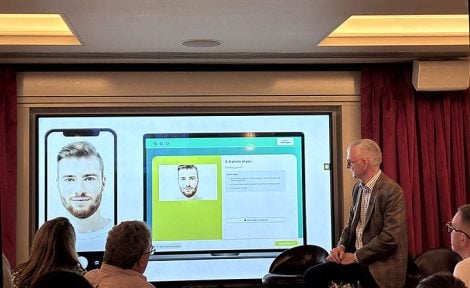Can we get digital conveyancing out of the group chat?
Lisa Isaacs asks if digital conveyancing will ever happen and whether legislation is the ultimate solution to slow and painful house transactions.
 It’s arguably one of the most debated issues in property: the speed and style of conveyancing. In articles, on podcasts, during panel discussions, in comment sections, across social media – everyone has an opinion.
It’s arguably one of the most debated issues in property: the speed and style of conveyancing. In articles, on podcasts, during panel discussions, in comment sections, across social media – everyone has an opinion.
But that’s just it. We desperately need a ‘less chat, more action’ approach, especially with the number of days it takes to sell a property breaching the 200-day mark for the first time. The embarrassing record was announced in June by Cavendish Estate Agents together with TwentyEA, with the 125 days between SSTC and completion of concern.
Let it be or make it law?
So, is it possible to get digital conveyancing out of the group chat? Is now the time to mandate change? I spoke to conveyancers, suppliers to the legal industry and digital pioneers to gauge opinion.

Tony Hill at ASAP says most ideas won’t work without Government legislation to standardise best practice and mandate implementation. For example, ASAP’s end-to-end conveyancing and sales progression service involves a digitised version of Propertymark’s PIQ but there’s also the BASPI.
Neither are compulsory and many agents are still scanning in forms that have been filled in by hand.
In agreement is Maria, the Chair of the Open Property Data Association (OPDA): “Without a clear and strong collective commitment or mandation from Government and/or regulators, digital conveyancing will not happen as fast as it could.”
Work already happening behind the scenes

How close are we to mandation? It’s on the horizon. “The commitment to Government digitisation of property data was announced by Angela Raynor and Matthew Pennycook on 9th February 2025, and the MHCLG projects to start delivering this are underway,” comments Maria.
“The digitisation of homebuying – one that’s underpinned by a secure trust framework – is guaranteed as one of the first use cases being delivered through the Department for Business & Trade’s Smart Data Economy initiative.”
It’s a process that will be expedited by The Data (Use and Access) Act 2025, which legislates that consumers have the right to access and share their data – including property, identity and financial – to enable transactions, and to receive better products and services.
Pushing the digital agenda
The OPDA is perhaps the most essential cog in the digitisation machine. It pioneered the UK’s first free and open-source industry data standard for digital property packs, and collectively agreed a trust model for data sharing.
Its member list includes portals, conveyancers, sales progression companies, lenders, credit reporting agencies, search providers, estate agents and software platforms – everyone who needs to interact during the conveyancing stage – illustrating the seriousness of the intent.
From September, we will be testing the governance principles of a property data trust framework in a sandbox environment.”
In fact, the OPDA represents the closest we have been to industry-wide digital adoption: “We are building the prototype for a smart data-enabled property pack as part of the Department for Business & Trade Smart Data challenge between now and October. From September, we will be testing the governance principles of a property data trust framework in a sandbox environment,” adds Maria.
Standing in the way of progress

So far, so good but there are issues to be addressed. “As the first independent conveyancing law firm to join the OPDA, Simply Conveyancing is proud to support the industry-wide movement toward greater transparency, improved data accessibility and digital innovation,” says the firm’s Vicky Quinn-Campbell. “But while real progress is being made, challenges remain around adoption, data consistency and ensuring all firms, regardless of size, can benefit from these changes.”
The nirvana of every conveyancer using one single piece of software that integrates digitally with the crucial outside agencies and suppliers is achievable but unlikely for now.
That said, Peter Ambrose’s Legalito platform already allows lawyers to communicate in any format they like – email, PDF or Word – all within one system.
Resistance within the law fraternity
“I think mindset is one of the biggest obstacles,” says Tony. “I don’t think we have broad agreement from all stakeholders that fully digitised conveyancing is the answer, especially from the legal profession where there are valid concerns around cyber security and the capacity of professional insurance policies to cover a digital process failure. We must also consider the potential cost and investment barriers – not everyone can afford to implement new technology to enable digitisation.”
Not everyone can afford to implement new technology to enable digitisation.”
Tony’s thoughts also include the need for conveyancing data be complete, reliable, standardised and, critically, upfront. It’s here where the OPDA feels we can learn from our past mistakes.
Learning to trust
“HIPs, including upfront searches and property condition reports, were the right idea but the execution failed partly because they didn’t address the fundamental infrastructure to make the data safe, secure, trustable and shareable. The world is very different now compared to 2007,” says Maria.
But we’re in a new era of trusted data sharing. “In the same way that Open Banking paved the way for easier finance transactions,” she adds, “Open Property will pave the way for new and better customer property services.”
The full package but make it digital
Part of a new Open Property eco system will include reservation agreements, digital property packs and upfront searches, and Fix My Legals is already pioneering a fresh approach to the latter.

“Upfront searches have made a huge impact at Fix My Legals,” says Roxanne Barker. “But anything that brings commitment upfront gets my vote. We’re now regularly completing in around 76 days, which is well below the industry average. When the information is ready early, everyone can make informed decisions faster and momentum builds from the start.”
Next, Roxanne will be pushing for exchanges within 50 days: “72 hour searches and upfront seller-ready contract packs (HIPs rebranded, really) can all support that goal but only if they’re used properly.”

Rob Gurney, Managing Director Ochresoft, part of the Landmark Information Group, agrees. “Upfront searches and complete, digitised sales packs are essential. Searches themselves don’t delay deals but getting a full, accurate pack ready on day one speeds up everything that follows.”
A place for AI
While Rob feels digitisation shouldn’t require legislation (he feels there should be a consensus but legal culture remains an obstacle), Peter of Legalito doesn’t believe anyone is actually coming to mandate changes. That’s not to say it won’t happen.

“Although conveyancing is the stumbling block, digitisation will happen but not for the reasons people think”, adds Peter. “AI used by clients and lenders will be the driver, with the digitisation of property transactions a happy byproduct.”
Indeed, the revolution has started. Ochresoft is embracing AI to streamline conveyancing via automation. “We’re seeing a lot of digital tools being used to manage new tasks that didn’t previously exist – lawyers are being expected to do more, not less. So, while there are efficiency gains, they’re currently only offsetting added responsibilities,” says Rob.
This is where Rob feels generative AI can be transformative. “AI will reduce the burden on lawyers by automating tasks that consume time, enabling the same team to process more transactions with greater accuracy and speed.”
Enquiring minds
Peter does send a warning to those who expect a magic pill to deliver fully digitised, AI-driven conveyancing. “Delays currently happen between instruction and exchange as buyers start asking questions, especially when presented title documents, TA forms and leasehold information packs.”
You can mandate digital practices and upfront information but you can’t mandate the behaviour of buyers and sellers.”
“The backward and forward then begins,” adds Peter. “Answers are incomplete or missing entirely, questions are drip fed, and additional enquiries are raised after the survey and searches are returned. You can mandate digital practices and upfront information but you can’t mandate the behaviour of buyers and sellers.”
For those who would interject at this point, championing upfront information, Peter has his doubts. “Material Information? Who is enforcing it? Agents won’t buy into Material Information until there are substantial fines for non-compliance. Digital logbooks? They’ll fall by the wayside when people are busy living and will need updating during the conveyancing stage.”
As any lawyer would, Peter also raises concerns about liability: “If you shift from the buyer raising enquiries to the seller pre-loading their sale with upfront information – effectively wiping out caveat emptor – you potentially create a new liability issue.”
It is, however, a new Open Property trust framework that should alleviate this worry, with only authentic, genuine and authorised property data available in the ether. Still, not everyone is in favour of total digitisation.
Balance tech with the personal touch
“I support digital transformation where it brings efficiency, visibility and speed but not at the cost of the human experience,” says Roxanne. “The goal shouldn’t be ‘fully digital’ just for the sake of it. Clients need someone they can call, someone who listens – someone who truly gives a damn – especially when a transaction is sensitive or complex.”
Roxanne says that while you can automate tasks, you can’t automate genuine compassion, which feeds into Peter’s point about buyers raising enquiries – the main friction point in conveyancing that undoubtedly benefits from the human touch. “We need to bring ownership back into conveyancing – real people, taking real responsibility. That means clear roles, proactive updates and a commitment to progress,” concludes Roxanne.











Isn’t it happening now? LMS? PEXA?